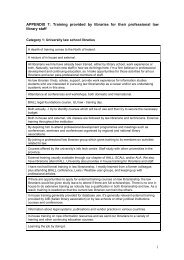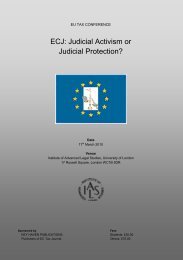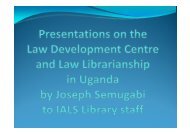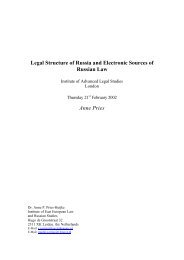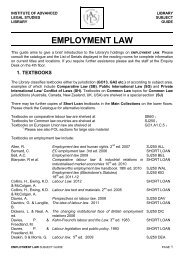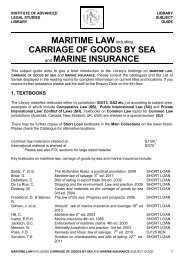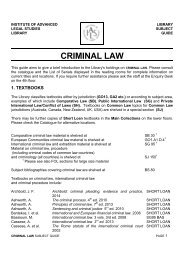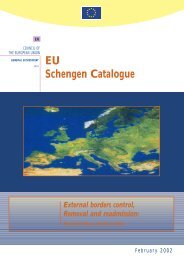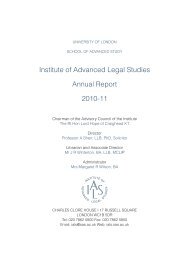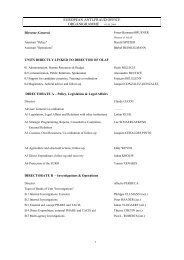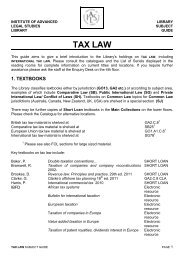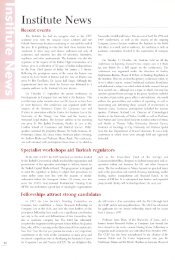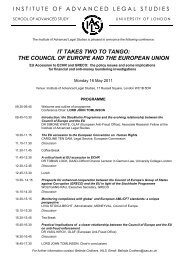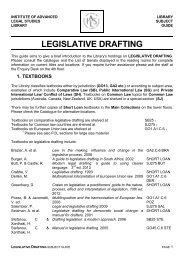a thesis - Institute of Advanced Legal Studies
a thesis - Institute of Advanced Legal Studies
a thesis - Institute of Advanced Legal Studies
Create successful ePaper yourself
Turn your PDF publications into a flip-book with our unique Google optimized e-Paper software.
54 EXPRESS TRUSTS.<br />
thing which, according to the nature <strong>of</strong> the property comprised in<br />
the settlement, was necessary to be done in order to transfer the<br />
property and render the settlement binding upon him. He may,<br />
<strong>of</strong> coarse, do this by actually transferring the property to persons<br />
for whom he intends to provide, and the provision will then be<br />
effectual, and it will be equally effectual if he transfers the property<br />
to a trustee for the purposes <strong>of</strong> the settlement or declares that he<br />
himself holds it in trust for these purposes."<br />
It appears moreover, from the case <strong>of</strong> Tierney v. Wood (1854,<br />
19 Beav. 330), that there is another method not mentioned by the<br />
Lord Justice, viz.: that where the legal estate in the trust property<br />
is outstanding, it is sufficient if the settlor directs the trustee<br />
to hold the property for the benefit <strong>of</strong> the ccstui que trust.<br />
These three methods <strong>of</strong> perfecting a voluntary trust are<br />
illustrated as follows:—<br />
Illustrations.<br />
Where the Settlor has Transferred the Trust Property to the Trustee.<br />
1. A. by voluntary deed conveys property in trust for himself<br />
(A.) for life, and after his death to pay thereout various<br />
annuities and, subject thereto, in trust for sale and division <strong>of</strong> the<br />
proceeds among his children, with power <strong>of</strong> revocation by deed<br />
attested by two or more credible witnesses. This creates a binding<br />
trust, and it is not revoked by a reconveyance <strong>of</strong> the property by<br />
B. to A. by deed not attested by two witnesses, nor by A.'s will.<br />
Ellison v. Ettison (1802), 6 Ves. 656.<br />
2. A., being <strong>of</strong> improvident habits and being in prison for<br />
debt, executes a voluntary settlement by which he assigns to B. all<br />
his interest in the property <strong>of</strong> his late brother upon certain trusts<br />
for the benefit <strong>of</strong> A. during his life and after his death for his<br />
children, with trusts over. A. marries and has a child. He cannot<br />
get the deed set aside on the ground that it is voluntary. Petre v.<br />
Espinasse (1834), 2 My. & K. 496.<br />
3. A., a single woman not immediately contemplating marriage,<br />
transfers a sum <strong>of</strong> stock to which she is absolutely entitled to<br />
trustees upon trust to pay the dividends to her until marriage, and<br />
after marriage upon the usual trusts <strong>of</strong> a marriage settlement. This<br />
is an irrevocable trust, and A. cannot have the deed set aside on



